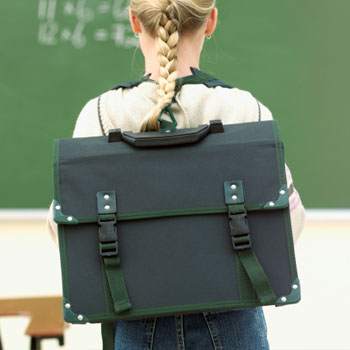Backpack Safety: What Are the Basic Rules?

Most kids carry backpacks to school everyday, and pediatricians, physical therapists and parents are reporting increasing numbers of schoolchildren complaining of back, neck and shoulder pain, along with tingling or numbness in their arms and hands. This is being attributed to children carrying heavy loads of schoolbooks in backpacks and often not following backpack safety rules and using the bag improperly.
However don’t scrap your child’s backpack and run out to buy a sling bag, or briefcase type book bag. Evidence exists that says these are even more harmful than the backpack. So what is a parent to do? Backpacks if made correctly, worn properly not over packed and packed correctly, are fine. A back friendly bag will have wide padded shoulder straps, a padded back, and a waist belt.
This takes care of most of the problems. The straps, on this type of bag, avoid the pinching of the shoulders by narrow unpadded straps on other backpacks. The waist belt and padded bag help to reduce the bouncing of the bag on the back. This reduces repetitive impact injury. Some backpacks even have a chest belt, and side straps to stabilize the load.
This type of backpack is obvious the better choice, because it uses the back and abdominal muscles, the two strongest muscle systems in the body, properly. A heavy backpack, incorrectly worn, can pull the child back, so the child leans forward to compensate for the pull. This can compress and possibly damage the vertebrae, causing back and neck pain.
This leaning forward also tends to cause the child to roll her shoulders inward. This with the forward lean can also compress the lungs and cause problems for asthmatic kids. The best backpacks are made of sturdy material, have padded wide shoulder straps, padded backs, waist and chest belts. These extra belts help to put some of the weight bearing on the legs and hips. You have the right backpack, now you have to make sure your child knows how to use it properly.
First teach her how to pack it properly, heavier items like textbooks should be placed closest to the back, don’t over-pack, and don’t pack anything you do not need for school, Now see that he lifts it properly, and that he uses both shoulder straps, the waist belt and any additional belts.. Before purchasing a backpack check on line for results of product testing and ratings, by reliable consumer protection groups, of any backpack you are considering.
Be aware that price is not always an indication of quality, nor does lower prices necessarily mean a poor product. You must do your homework. Also look on line for wholesale dealers in backpacks .We found a top brand backpack that has all the proper padding all the belts and a mini frame to help support the load for just a thirty dollars more than the average mid-range back pack.
More important than the price is that you get the right type of backpack, and that your child uses it because the best most expensive ergonomically sound backpack in the world, is worthless if she doesn’t follow the backpack safety rules.
Author Bio
Elaine Smith is a successful freelance writer providing advice for consumers on purchasing a variety of School Backpacks, Backbacks, and more! Her numerous articles provide a wonderfully researched resource of interesting and relevant information.
Article Source: http://www.ArticleGeek.com – Free Website Content
